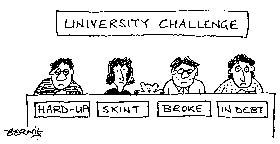I enjoy BBC Radio 4’s Any Questions and feel privileged when I am asked to join Jonathan Dimbleby’s panel.
I enjoy BBC Radio 4’s Any Questions and feel privileged when I am asked to join Jonathan Dimbleby’s panel. But like (I suspect) any other panellist when the On Air light goes on, I’m conscious of a temptation to play to the gallery and adjust my opinions and the force with which I express them to maximise either cheers or boos — or at least elicit a strong reaction. The reaction one most fears is the bored or baffled silence that may follow too nuanced or uncertain an answer.
This is not a modern tendency, or the peculiar influence of Any Questions. It’s the way an open democracy pushes those who seek public approval. ‘Have I said something foolish?’ was the reported reaction of Phocion to his friend, Diogenes Laertius, after the crowd applauded a point in his speech, 2,161 years ago.
Joining Mr Dimbleby’s panel for the first Any Questions of 2011 I had guessed that control orders would come up: we are awaiting an announcement of the new government’s reconsideration of what is effectively house arrest, without charge, for some suspected terrorists, and by the time you read this we may know the shape of these proposals. When Dimbleby asked my view I replied honestly that I found the issue difficult, so, trusting Nick Clegg’s instincts in such matters (and slightly mistrusting the reflexive deference many Conservative politicians accord anyone in a uniform), I was content to be guided by the Deputy Prime Minister’s conclusions.
Silence from the audience.
Jonathan Dimbleby pressed harder. What if there was evidence that unless a particular individual was constrained there was ‘a risk he might join in a terrorist attack’? Would my instinct be to compromise his liberties?
I hesitated. My thoughts were ‘Well, it all depends.’ ‘I’d deny his liberties,’ I said, drawing a scattering both of applause and of jeers.
But pause, as I did on the train home, and unpick question and answer. The Dimbleby scenario admits of a wide range of possible examples. Here are three:
1) Suspect has been secretly phone-tapped boasting with like-minded mates about a general ambition to commit a terrorist offence; but no evidence of a plan, or reason to be confident a plan will emerge. On balance, a fantasist, but are we sure?
2) Ditto, except that embryonic conspiracy now detectable though there’s doubt as to whether or when suspect will carry it through: a putative rather than an actual conspiracy.
3) Close secret surveillance gives overwhelming evidence that suspect shortly to depart for terrorist training camp in Pakistan in preparation for planned bomb attack in London; evidence for arrest still insufficient; fear of losing track of him once abroad.
There exists, perhaps, a small number of my fellow citizens for whom the circumstances outlined in (1) would be sufficient to justify an immediate control order, and effective house arrest; but I’m confident most of us would conclude that it would be better simply to keep an eye on the suspect without his knowledge, just in case.
There exists, perhaps, a small number of my fellow citizens for whom the circumstances outlined in (3) would still be insufficient to justify any kind of constraint, and who would be prepared to bite the bullet and let the suspect depart these shores, in hopes of being able to detect him on re-entry and re-establish surveillance.
I’m confident, though, that at least three quarters of my countrymen would, like me, opt to detain the suspect in (3) and decline to detain him in (1). So far as (2) is concerned, we’d want to know more. Just how strong is the evidence? If strong, how prejudicial to the work of the intelligence services would it be to reveal it to judge and jury in court? Would a warning that the authorities were on to him not be sufficient to neutralise this individual? What might be the case for allowing this putative crime to ripen a little further, to the point where we can be sure — and perhaps prosecute for conspiracy? On receiving answers to these questions we might be divided among ourselves how or whether to proceed.
And on the general point — whether control orders should be available at all — we’d want to know whether scenarios like (3) ever actually do occur; and how often type-(2) scenarios actually occur and how strong is the likelihood, if they do, that there will be no other way of dealing with the situation and that, un-dealt-with, it will result in death or serious injury. Finally, we would ponder the undoubted cost to the self-confidence of a free society that comes with such interferences with ordinary rights, and ask if it was a price worth paying. It might or might not be. We would try to quantify, and balance.
In short, we do not believe that the citizen’s right to be deprived of his liberty only if convicted of a criminal offence is absolute, trumping all else in any imaginable situation. We would without hesitation rugby-tackle someone we thought about to detonate a bomb, without pondering the evidence. We believe the right to due process is very important and would give it great weight in any balance; but not infinite weight.
So this is the answer I should have given Jonathan Dimbleby:
‘I cannot honestly say that there are no circumstances in which I might not take away a person’s liberties to forestall a crime; but I really don’t know if these circumstances arise often enough, or pose a sufficiently serious national threat, to justify this significant erosion of our civil liberties…’
…but already I sense the audience drifting away.







Comments